Max-Emil King
@maxemilking.bsky.social
Researcher at the Ragnar Frisch Centre for Economic Research. www.frisch.uio.no
www.maxemilking.com
www.maxemilking.com
Late working hours are often seen as a barrier to gender equity in politics and beyond🧱.
My findings need not imply that family-friendly scheduling is bad policy, but if early meetings backfire for working-class politicians, that trade-off needs to be part of the conversation. 9/10
My findings need not imply that family-friendly scheduling is bad policy, but if early meetings backfire for working-class politicians, that trade-off needs to be part of the conversation. 9/10
July 6, 2025 at 8:03 AM
Late working hours are often seen as a barrier to gender equity in politics and beyond🧱.
My findings need not imply that family-friendly scheduling is bad policy, but if early meetings backfire for working-class politicians, that trade-off needs to be part of the conversation. 9/10
My findings need not imply that family-friendly scheduling is bad policy, but if early meetings backfire for working-class politicians, that trade-off needs to be part of the conversation. 9/10
Early sessions, however, increase absences among politicians with inflexible private-sector day jobs by 6 percentage points (~27% relative to their mean).
These jobs are typically in the low-skilled/service sector. 8/10
These jobs are typically in the low-skilled/service sector. 8/10
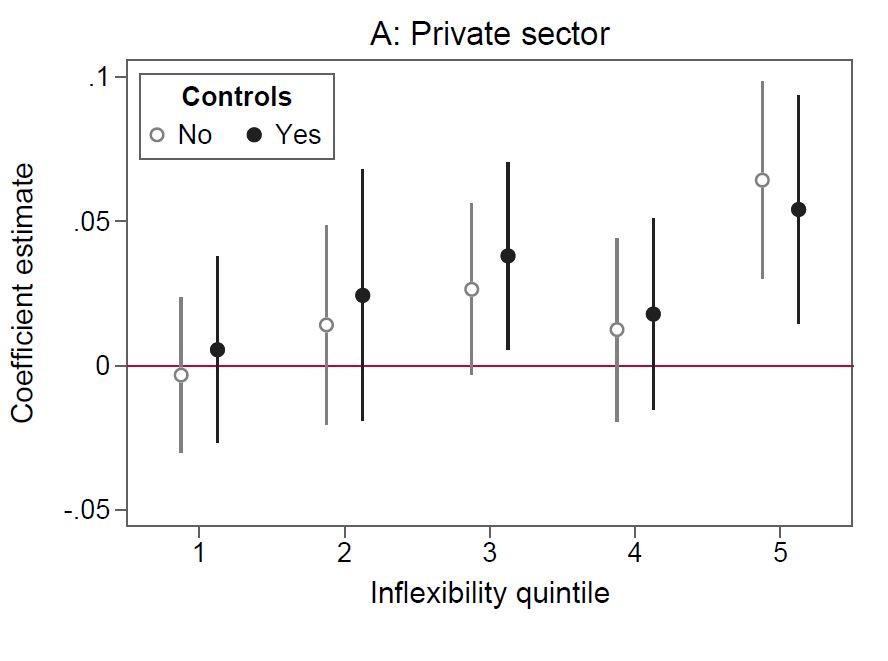
July 6, 2025 at 8:02 AM
Early sessions, however, increase absences among politicians with inflexible private-sector day jobs by 6 percentage points (~27% relative to their mean).
These jobs are typically in the low-skilled/service sector. 8/10
These jobs are typically in the low-skilled/service sector. 8/10
Results: Neither women in general (Panel A), nor women with children (Panel B), are more likely to attend meetings held at family-friendly hours.
I discuss possible reasons for this null result in the paper.🤔7/10
I discuss possible reasons for this null result in the paper.🤔7/10
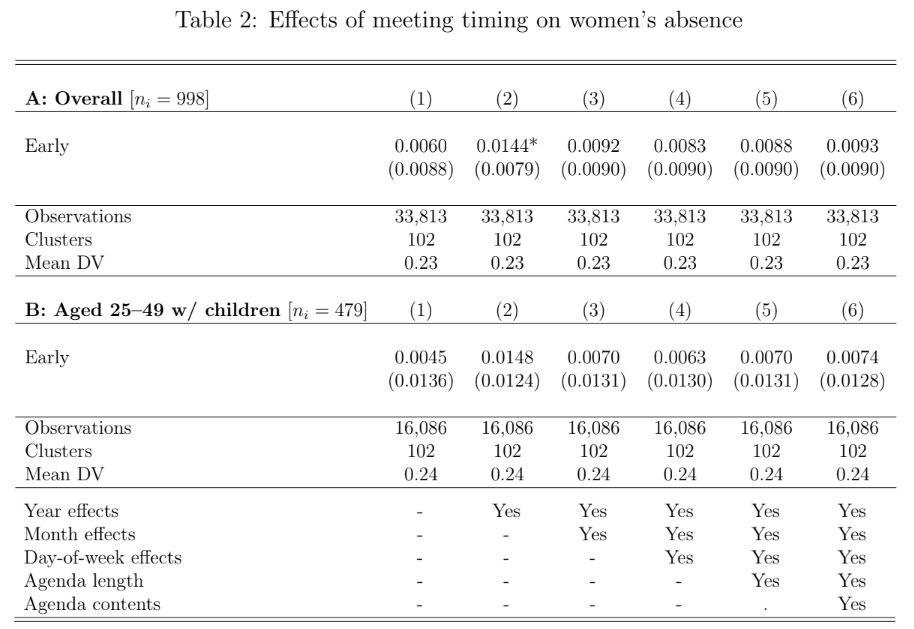
July 6, 2025 at 8:01 AM
Results: Neither women in general (Panel A), nor women with children (Panel B), are more likely to attend meetings held at family-friendly hours.
I discuss possible reasons for this null result in the paper.🤔7/10
I discuss possible reasons for this null result in the paper.🤔7/10
Importantly, this timing variation is conditionally balanced with respect to the topics discussed (black circles in the figure), suggesting it is unrelated to individual preferences for attending. 6/10
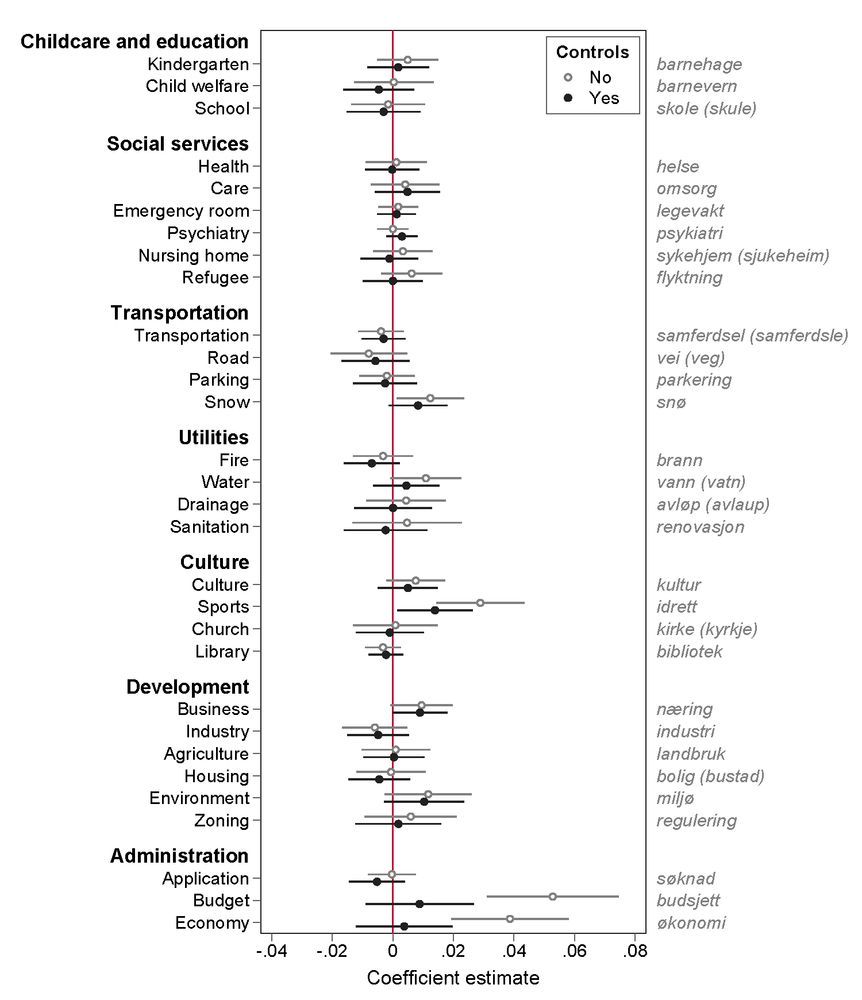
July 6, 2025 at 8:00 AM
Importantly, this timing variation is conditionally balanced with respect to the topics discussed (black circles in the figure), suggesting it is unrelated to individual preferences for attending. 6/10
I exploit within-council variation in session timing – such as in Sør-Aurdal municipality – to assess who is less likely to be absent when meetings are held early (~11am 🌞) vs. late (~5pm 🌙). 5/10
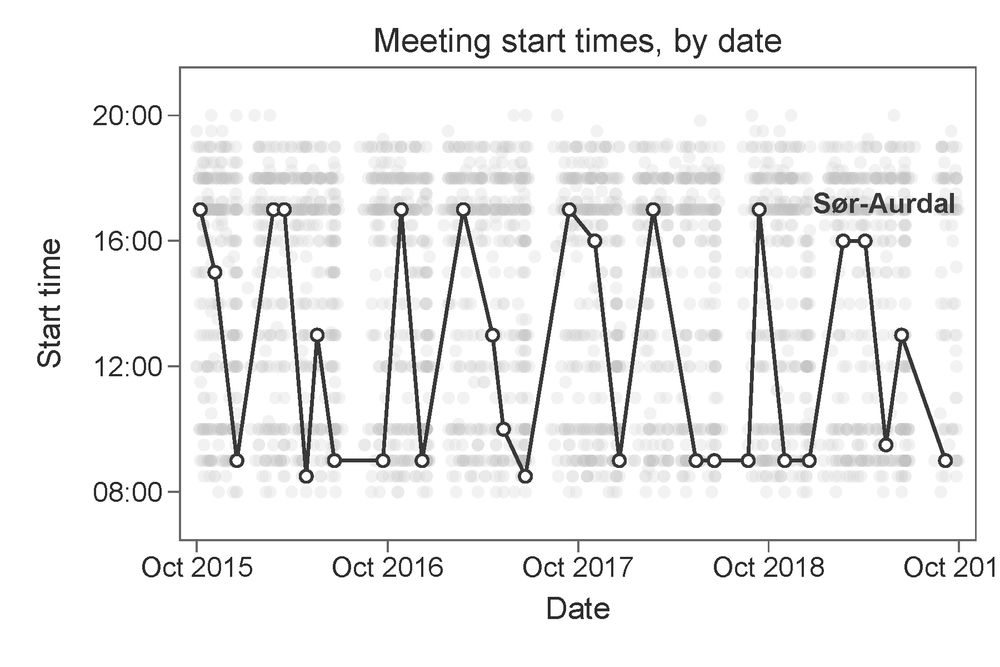
July 6, 2025 at 7:59 AM
I exploit within-council variation in session timing – such as in Sør-Aurdal municipality – to assess who is less likely to be absent when meetings are held early (~11am 🌞) vs. late (~5pm 🌙). 5/10
Norway provides a compelling setting: recent years have seen growing debate over council meeting times, especially calls for more daytime sessions. 4/10
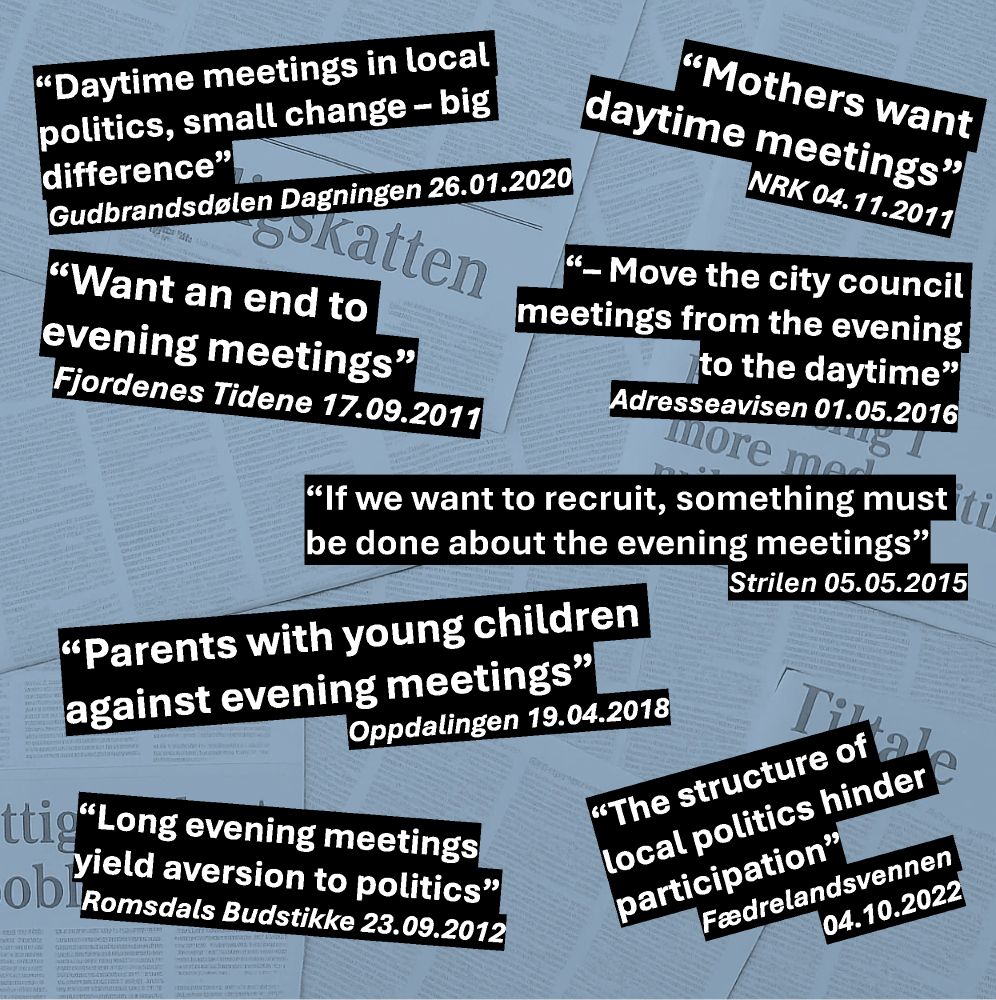
July 6, 2025 at 7:57 AM
Norway provides a compelling setting: recent years have seen growing debate over council meeting times, especially calls for more daytime sessions. 4/10
I study a 25% random sample of Norwegian municipalities, hand-coding individual-level attendance for all 2,620 politicians across 3,334 local council meetings (2015–2019).
Attendance is generally high, but each session sees 10–15% absence due to illness, childcare, urgent work, etc. 3/10
Attendance is generally high, but each session sees 10–15% absence due to illness, childcare, urgent work, etc. 3/10
July 6, 2025 at 7:54 AM
I study a 25% random sample of Norwegian municipalities, hand-coding individual-level attendance for all 2,620 politicians across 3,334 local council meetings (2015–2019).
Attendance is generally high, but each session sees 10–15% absence due to illness, childcare, urgent work, etc. 3/10
Attendance is generally high, but each session sees 10–15% absence due to illness, childcare, urgent work, etc. 3/10
Instead, holding meetings at earlier, more family-friendly times reduces participation among politicians with inflexible, often low-skilled day jobs⚠️.
This challenges the idea that scheduling reforms are a silver bullet for inclusion. 2/10
This challenges the idea that scheduling reforms are a silver bullet for inclusion. 2/10
July 6, 2025 at 7:52 AM
Instead, holding meetings at earlier, more family-friendly times reduces participation among politicians with inflexible, often low-skilled day jobs⚠️.
This challenges the idea that scheduling reforms are a silver bullet for inclusion. 2/10
This challenges the idea that scheduling reforms are a silver bullet for inclusion. 2/10
Late working hours are often seen as a barrier to gender equity in politics and beyond.🕔
My findings need not imply that family-friendly scheduling is bad policy, but if early meetings backfire for working-class politicians, that trade-off needs to be part of the conversation. 9/10
My findings need not imply that family-friendly scheduling is bad policy, but if early meetings backfire for working-class politicians, that trade-off needs to be part of the conversation. 9/10
July 5, 2025 at 6:03 PM
Late working hours are often seen as a barrier to gender equity in politics and beyond.🕔
My findings need not imply that family-friendly scheduling is bad policy, but if early meetings backfire for working-class politicians, that trade-off needs to be part of the conversation. 9/10
My findings need not imply that family-friendly scheduling is bad policy, but if early meetings backfire for working-class politicians, that trade-off needs to be part of the conversation. 9/10
Instead, politicians with inflexible private-sector day jobs are negatively affected by early meetings: their absence increases by 6 percentage points (~27% relative to their mean).
These jobs are typically in the low-skilled/service sector. 8/10
These jobs are typically in the low-skilled/service sector. 8/10

July 5, 2025 at 5:59 PM
Instead, politicians with inflexible private-sector day jobs are negatively affected by early meetings: their absence increases by 6 percentage points (~27% relative to their mean).
These jobs are typically in the low-skilled/service sector. 8/10
These jobs are typically in the low-skilled/service sector. 8/10
Results: Neither women in general (Panel A), nor women with children (Panel B), are more likely to attend meetings held at family-friendly hours.
I discuss possible reasons for this null result in the paper. 7/10
I discuss possible reasons for this null result in the paper. 7/10

July 5, 2025 at 5:22 PM
Results: Neither women in general (Panel A), nor women with children (Panel B), are more likely to attend meetings held at family-friendly hours.
I discuss possible reasons for this null result in the paper. 7/10
I discuss possible reasons for this null result in the paper. 7/10
Importantly, this variation is conditionally balanced with respect to the topics discussed in the meetings (see black circles in the figure), suggesting it is unrelated to individual preferences for attending. 6/10

July 5, 2025 at 5:21 PM
Importantly, this variation is conditionally balanced with respect to the topics discussed in the meetings (see black circles in the figure), suggesting it is unrelated to individual preferences for attending. 6/10
I exploit within-council variation in session timing – such as in Sør-Aurdal municipality – to assess who are less likely to be absent when meetings are held early (~11am 🌞) vs. late (~5pm 🌙). 5/10

July 5, 2025 at 5:20 PM
I exploit within-council variation in session timing – such as in Sør-Aurdal municipality – to assess who are less likely to be absent when meetings are held early (~11am 🌞) vs. late (~5pm 🌙). 5/10
Norway provides a compelling setting: in recent years, local media have featured growing debate around council meeting times, especially calls for more daytime sessions. 4/10
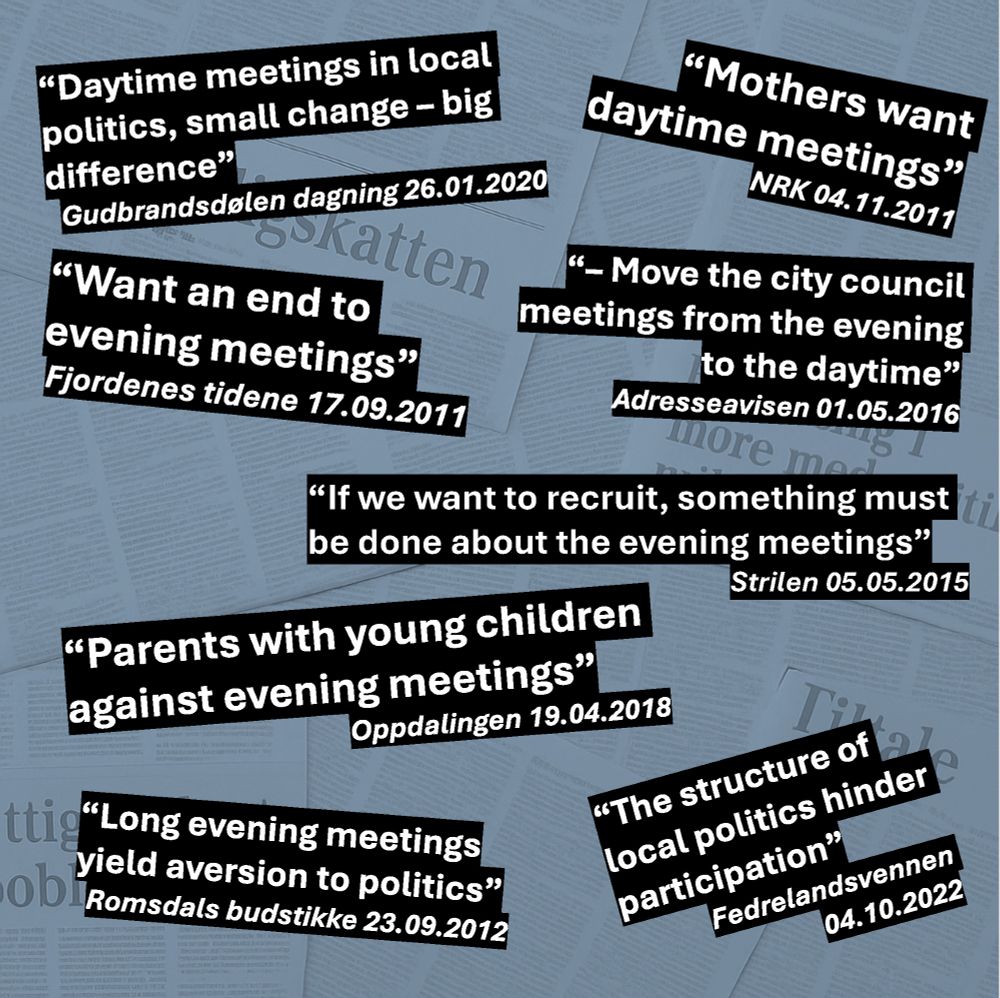
July 5, 2025 at 5:19 PM
Norway provides a compelling setting: in recent years, local media have featured growing debate around council meeting times, especially calls for more daytime sessions. 4/10
I study a 25% random sample of Norwegian municipalities, hand-coding individual-level attendance for all 2,620 politicians across 3,334 local council meetings (2015 – 2019).
Attendance is generally high, but each session sees 10–15% absence due to illness, childcare, urgent work, or similar. 3/10
Attendance is generally high, but each session sees 10–15% absence due to illness, childcare, urgent work, or similar. 3/10
July 5, 2025 at 5:18 PM
I study a 25% random sample of Norwegian municipalities, hand-coding individual-level attendance for all 2,620 politicians across 3,334 local council meetings (2015 – 2019).
Attendance is generally high, but each session sees 10–15% absence due to illness, childcare, urgent work, or similar. 3/10
Attendance is generally high, but each session sees 10–15% absence due to illness, childcare, urgent work, or similar. 3/10
Instead, holding meetings at earlier, more family-friendly hours reduces participation among politicians with inflexible daytime commitments.
This challenges the idea that scheduling reforms are a silver bullet for inclusion. 2/10
This challenges the idea that scheduling reforms are a silver bullet for inclusion. 2/10
July 5, 2025 at 5:17 PM
Instead, holding meetings at earlier, more family-friendly hours reduces participation among politicians with inflexible daytime commitments.
This challenges the idea that scheduling reforms are a silver bullet for inclusion. 2/10
This challenges the idea that scheduling reforms are a silver bullet for inclusion. 2/10
Reposted by Max-Emil King
10/ Please help share our extended replication to correct the record on this misleading policy evaluation!
Full replication text here: www.econstor.eu/handle/10419...
Full replication text here: www.econstor.eu/handle/10419...
Re-Analysis of Ciacci, R. (2024). Banning the purchase of sex increases cases of rape: evidence from Sweden.
EconStor is a publication server for scholarly economic literature, provided as a non-commercial public service by the ZBW.
www.econstor.eu
May 9, 2025 at 9:29 AM
10/ Please help share our extended replication to correct the record on this misleading policy evaluation!
Full replication text here: www.econstor.eu/handle/10419...
Full replication text here: www.econstor.eu/handle/10419...

